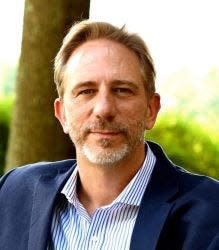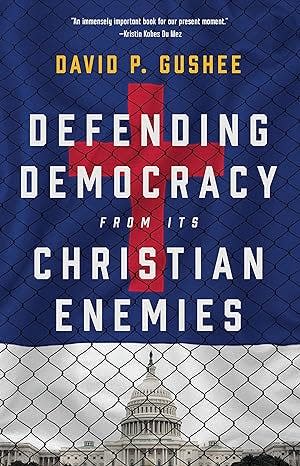Theologian: 'Reactionary' Christians are a threat to democracy
- Oops!Something went wrong.Please try again later.

One of the country's foremost experts on religion warns that America may be at risk from religious reactionaries rejecting democracy in defense of their values.
David P. Gushee, distinguished university professor of Christian ethics at Mercer University, wrote the new book "Defending Democracy from its Christian Enemies," which examines the deepening ties between evangelical Christianity and hard-right politics.
Chair of Christian social ethics at Vrije Universiteit and senior research fellow at the International Baptist Theological Study Centre, both in Amsterdam, Gushee said he was motivated to write the book after seeing so many Christians engaged in violence Jan. 6, 2021, at the the U.S. Capitol.
At least 64 Ohioans have been arrested. Last year, John Douglas Wright of Plain Township was sentenced to 49 months in federal prison for his actions during the incident.
Gushee admits being surprised at seeing so many Christian flags that day.
"I shouldn't have been surprised, I guess, now that I think about it," he said. "In fact, if you look at my book, the cover is the Christian flag superimposed on the Capitol. I mean, for some of us who have traditional Christian backgrounds, for (that flag) to be in a violent mob attacking the Capitol, it was just shocking. As a scholar, I wanted to make sense of that."
He describes MAGA evangelicals as a mix of people who hold fast to conservative Christian values, and those who are "post-Christian."
"(Post-Christians) don't go to church; they're only vaguely Christian, but they identify Christianity with Trumpism. Opposition to immigration, cultural resentments and anti-feminism and anti-diversity, equity and inclusion," he said. "They identify with all of that, and their votes reflect that."
Is it divine appointment?
Those issues, Gushee said, enable them to forgive Donald Trump's foibles and embrace the idea that God is using Trump despite his faults.

"You can hear at least three kinds of motifs," he said. "One is Trump is a kind of savior, the savior of America, the savior of Christianity. And then, Trump is the 'anointed one,' raised up to be a leader. When you think about the Old Testament, anointed leaders were often unlikely people. I was just reading the story of how Samuel picks David. He's the unlikely choice, right? And there's the one where God used King Cyrus to let the Israelites go back home. So, I mean, if you're looking for justification for something, you can usually find it. So, the idea that Trump is very likely his choice because he's got a bad track record is even more evidence that God must have picked him out because only God would do something as grand as that, right?"
Evangelical tour draws hundreds 'It's how we're going to take this country back.' ReAwaken America tour hits Canton
Gushee said that in some circles, Trump's legal troubles are being compared to Jesus' unjust prosecution and persecution by the Romans.
"So, like Jesus, Trump is suffering," he said. "A national savior is kind of where it has gotten. It's very, very dangerous."
Gushee said reactionary Christianity is happening around the world.
"In the book, I talk about Russia, and Hungry, and Brazil under Bolsonaro, and Poland − until that government was just voted out − as examples of parties and politicians being able to say to the traditional religious majority 'Hey, vote for us and we will make our country great again, restore traditional values, fight off the liberals, make sure everybody knows that this country really belongs to us, to our church, to our people, to our values,'" he said.
The book also examines the Black church.
"The Black church has been involved in politics partly because of a lack, historically, of access to political power," he said.
Though Black Christians tend to be socially conservative, Gushee explained why they've been resistant to political extremism.
"On issues of civil rights, they're not conservative," he said. "They take seriously the history of racism in this country and want to see it corrected. And they know about white supremacy and the way that it demeans and mistreats people of color, and so there will never be a majority of Black voters who will be interested in supporting a movement that seeds itself with racist undertones. We only have two parties, unfortunately, and neither party perfectly reflects what I would understand Christian values to be. So, it's kind of like, which values do people lift up as most important? Which ones do they see are most important to vote on?"
Gushee argues that churches and pastors need to keep a proper distance from politics.
"Ultimately, you have to think about what are the values that Christians should care about," he said. "Christians need to think about what those values are, and preachers need to talk about the values that are at stake. And sometimes it's going to lean you in one direction politically rather than the other."
Polls reveal that overall, American church membership is in decline, particularly among young evangelicals who are offended by the merger of religion and right-wing politics.
A transcendent figure
"If loyalty to Donald J. Trump becomes the litmus test to be OK in a religious community, then we're really in trouble," Gushee said. "I know pastors who were forced out of their jobs or felt the need to leave, and as early as 2016, because their people fell hard for Trump and they as the pastor wouldn't give them what they wanted. And they were under pressure and they left."
He said the decline of religiosity and church attendance may be having the paradoxical effect of some people transforming their politics into a quasi-religion.
"They're not finding transcendent meaning in church or God or Jesus anymore," he said. "If your movement or your community is not to be found in church, maybe it's going to be found at rallies. You see people who've been to 50 Trump events just because that's their people; that's their tribe. One reason why he's had such a loyal base of support is because of what he has provided for people. It goes beyond traditional politics. It's more like a transcendent figure to trust, to hope in."
Gushee said he worries some Christians might be willing to abandon democracy if they think their values are being threatened.
"Democracy is not perfect," he said. "But democracy is a whole lot preferable to dictatorship. And the rule of law, with civil rights protections, is a precious achievement and we need to protect it. Protecting our democracy is far more important than any other issue that we will be voting on in 2024. Christians need to be reminded of why democracy is worth protecting."
Reach Charita at 330-580-8313 or charita.goshay@cantonrep.com. On Twitter: @cgoshayREP.
This article originally appeared on The Repository: Mercer prof says 'reactionary' Christians are a threat to democracy
